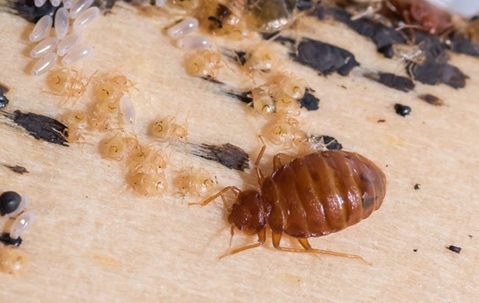Bed Bug Exterminator Houston Services: Top-Rated Elimination Solutions
Reliable Parasite Control Steps to Safeguard Your Yard and Plants
In the realm of gardening, the harmony of a well-tended yard can often be interrupted by undesirable pests that intimidate the wellness and vitality of plants. As gardeners make every effort to keep a flourishing exterior room, the difficulty of bug control arises as an important element of their gardening endeavors. Implementing reliable parasite control measures not just safeguards the yard's visual allure yet likewise plays an essential duty in protecting the plants' well-being. By discovering a variety of approaches that incorporate natural repellents, useful insects, companion planting, do it yourself options, and environmentally-friendly chemicals, gardeners can navigate the detailed globe of bug administration with precision and care.
Natural Insect Repellents

An additional efficient all-natural insect repellent is diatomaceous planet, a grainy compound made from fossilized marine organisms. Diatomaceous earth works by physically harming bugs with its unpleasant structure, making it an outstanding alternative for regulating insects like slugs, beetles, and caterpillars. In addition, planting companion plants like marigolds, lavender, or basil can assist ward off insects as a result of their solid fragrances or all-natural chemical compounds.
Beneficial Insects for Insect Control

One more helpful bug is the parasitic wasp, which lays its eggs inside parasite bugs, eventually eliminating them. Ground beetles are exceptional for managing caterpillars, snails, and slugs. Hoverflies, often mistaken for bees due to their comparable appearance, prey on aphids, thrips, and caterpillars.
To bring in useful pests to your garden, you can grow a diverse variety of flowering plants, such as dill, fennel, and yarrow, which supply nectar and plant pollen for adult bugs. Additionally, avoid using broad-spectrum chemicals that can damage both hazardous and valuable pests. By creating an inviting atmosphere for these valuable pests, you can decrease the need for chemical pesticides and advertise a healthier, extra well balanced garden environment.
Friend Growing Techniques
When intending to enhance the effectiveness of helpful bugs in your garden for all-natural insect control, thinking about companion planting techniques can better maximize the community equilibrium. Buddy growing includes tactically positioning certain plants beside each other to maximize see post their common benefits, such as preventing parasites, drawing in beneficial pests, or improving vitamins and mineral uptake - bed bug exterminator houston near me. One popular instance is growing marigolds alongside tomatoes to fend off nematodes and various other hazardous bugs while additionally attracting pollinators
In addition, including aromatic herbs like basil, mint, or rosemary in between veggie rows can help deter parasites with their solid scents. An additional effective technique is planting flowers such as sunflowers, zinnias, or universes to draw in pollinators like bees and butterflies, which subsequently can help in pollinating your vegetables and fruit plants. Planting catch plants like nasturtiums can divert bugs away from your primary crops, offering as sacrificial plants that protect your beneficial fruit and vegetables. By applying buddy planting techniques, you can create a diverse and unified garden ecological community that normally manages insects while promoting plant health and wellness and performance.
Do It Yourself Pest Control Solutions
To successfully manage insects in your garden, implementing do-it-yourself insect control solutions can be an economical and eco friendly strategy. One usual do it yourself bug control solution is read this post here creating self-made insecticidal soaps by mixing moderate soap with water to control soft-bodied pests like aphids, termites, and whiteflies. Furthermore, presenting useful insects such as ladybugs, lacewings, and predacious wasps can aid naturally control insect populations in your garden. Establishing physical obstacles like row covers or netting can also protect against insects like caterpillars from damaging your plants.
Buddy growing specific natural herbs and flowers like marigolds, basil, and lavender can help drive away pests and draw in helpful insects. By including these DIY bug control solutions right into your horticulture regimen, you can protect your garden and plants without relying on severe chemicals.
Environmentally-Friendly Pesticides

Another reliable choice is diatomaceous planet, an all-natural material made from fossilized water organisms, find out here which can be sprayed around plants to control slugs, snails, and various other crawling insects. Additionally, insecticidal soaps and oils originated from plant-based sources serve for regulating soft-bodied pests like aphids, mites, and whiteflies.
Verdict
In verdict, efficient pest control actions such as all-natural repellents, valuable bugs, companion growing methods, DIY options, and environmentally-friendly pesticides are essential for securing your garden and plants. By carrying out these methods, you can stop damage caused by pests and preserve a healthy and growing yard community. It is necessary to think about the long-term effect of utilizing chemicals and choose more sustainable and eco-friendly choices to make certain the health and well-being of your plants and the setting.